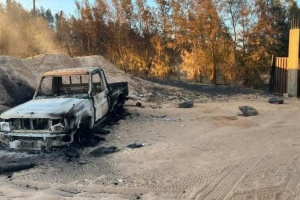The Guardian has revealed a confidential investigation report of the United Nations covering the period from March 2021 to April 2022, disclosing violations of international law by Russia’s Wagner Group in supporting Khalif Haftar during his war on Tripoli by using mines randomly in civilian areas.
“Russian mercenaries in Libya systematically broke international law by laying mines in civilian areas without any attempt to mark their location or remove the lethal devices,” the UN investigators have found.
According to a confidential UN report that will be made public in the coming weeks, fighters from the Wagner Group, a private military company that has been repeatedly linked to the Kremlin by western officials, also rigged booby traps to powerful explosive anti-tank weapons that were responsible for the death of two mine clearers working for an NGO.
The Guardian added that UN investigators suspect that a booby trap found in a civilian neighborhood in Tripoli – made of a mortar shell and plastic explosive attached to a teddy bear – was also the work of Wagner fighters.
The conclusions of the report, by a specialist team that works for a UN committee charged with monitoring the sanctions regime and arms embargo on Libya, will reinforce growing concern in western capitals about the role played by Wagner across Africa.
The UN report seen by the Guardian covers 13 months from March 2021 to April 2022, though the accusation that Wagner indiscriminately used mines in civilian areas dates back to when the group’s fighters supported the advance on Tripoli launched by Khalifa Haftar, giving large numbers of powerful anti-personnel and anti-tank mines to defend their positions.
The Guardian said the report found that Wagner operatives took no such precautions when they laid 35 anti-personnel mines in civilian areas of the Ain Zara municipality.
“This failure to avoid, or at least to minimize, incidental effects of the deployed ordnance on the civilian population … rendered their method of warfare unlawful,” the report says.
Shortly after the withdrawal of Wagner from their positions in Ain Zara, a booby-trapped mine killed two civilian mine clearers.
“The device was unmarked and attached to a harmless object inside a civilian house,” the report adds.
Investigators also found that Wagner operatives made no attempt to follow international law when they laid booby-trapped anti-tank mines along a road in southern Tripoli likely to be used by civilians after their withdrawal.
The report lists at least 175 Russian Federation military flights carrying nearly 10,000 tonnes of cargo between 1 May 2021 and 31 March 2022, which Moscow said comprised “humanitarian assistance to Libya, including the supply of vaccines against Covid-19”.
According to The Guardian, some of the investigators’ conclusions were based on a tablet left by Wagner when they withdrew.
The device was obtained by journalists and examined by the UN team. The tablet stored a 10-page document from January 2020, which included a list of the weapons and equipment required for various sub-units within Wagner in Libya and codenames of senior Wagner staff.
These include a “director general” who the investigators identify as “highly probably Yevgeny Prigozhin”, a businessman with close links to Vladimir Putin. Prigozhin has denied to the Guardian that he has any links with Wagner.
The report says that experts believe there are about 2,000 Russian mercenaries in Libya, 1,000 fewer than at the peak of fighting two years ago, adding that the continuing presence of Chadian, Sudanese and Syrian fighters, and private military companies in Libya is still a serious threat to the security of Libya and the region.








